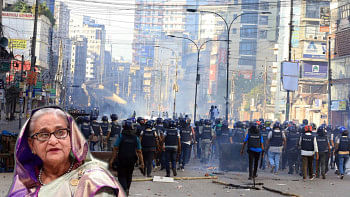Narendra Modi's India and recoil of a gun
India under Narendra Modi is working like the recoil of a gun, when forward thrust is producing backward momentum. In most small arms, that momentum is transferred to the ground through the body of the shooter, while in heavier guns, it's transferred through its mount. In India, that momentum is being transferred to the ground through organised hatred and a spate of hate crimes.
In other words, India right now is switched to Newton's third law of motion as every action produces, if not equal, but opposite reaction. While Prime Minister Modi is busy promoting his country abroad, India is descending into serious chaos. One Muslim man near Delhi was killed by a Hindu mob for eating beef, although the meat found in his fridge was mutton. In another instance, a Muslim man was beaten and stripped by Bajrang Dal in Mangalore for making a conversation with a Hindu woman. Another Hindu organisation in Mandvi, Gujarat, banned Muslims from entering all dance venues during the recent Navratri celebration to "protect the Hindu girls" from them. A 90-year-old Dalit man was burned alive for trying to enter a temple in Uttar Pradesh.
The list goes on. This week 300 people were forcibly converted to Hinduism in a village near Varanasi. It was conducted by an organisation called the Dharma Jagran Samanvya Samiti, which handed over the Gita and Hanuman Chalisa to the converts under its Ghar Wapsi (Home Coming) initiative. Only a few days ago, ghazal maestro Ghulam Ali was sent back to Pakistan after Shiv Sena objected to his Mumbai concert. This far-right group allegedly smeared the face of a man with ink in Mumbai, because he was organising the book launch of a former foreign minister of Pakistan.
All of these incidents took place when the Indian prime minister was positioning his country as the logical destination for foreign business and technology giants. Many of these giants have already responded to his call. They have pledged to include India in their bucket lists.
Meanwhile, a progressive India has been regressing in some fundamental ways. Religious and caste tensions have always simmered under the surface of its political and social dynamics. But the world's largest democracy managed to surge ahead, keeping the undertows of prejudice and superstition at a subliminal level. Now that simmering tension is boiling over again, as religious animosity and the class conflict are sparking renewed vitriol and violence.
And this time it's different from before. Until the election of Narendra Modi, the Indian governments appeared determined to stamp out these pockets of national contentions. But that tide has turned over the last one year since the Hindu extremists vowed to make India a Hindu state. Many Indians are resigned to the belief that much of the ongoing madness has the political blessings of the ruling party. In protest, 41 eminent Indian writers so far have returned their awards.
If we apply the template of history on the Indian situation, Narendra Modi's India stands at a critical juncture comparable to Lyndon Johnson's America with a reverse twist. For centuries, the United States seethed with racial hatred as segregation and lynching had reduced the Black American into targets of the white supremacists. And it was not until Johnson signed the Civil Rights Act of 1964 and sent the federal troops to Alabama the following year that racial discrimination in the United States was broken like a bad spell.
In India, it's going in the opposite direction. While the prime minister carries his own baggage of extremist records (the Gujarat riot in 2002), his government hasn't strongly come out against mushrooming tragedies of minority persecution. The prime minister himself has been tongue-in-cheek in his condemnation, his harshest reaction uttered at an election rally in Begusarai, Bihar on October 8. He asked the Hindus and Muslims if they wanted to fight each other or poverty.
When lives are lost and sentiments are hardened, that rap on the knuckles is too little too late. No doubt it was a legitimate question for all Indians, but it failed to convey a strong message to the Hindu extremist groups, who have the missionary zeal spiked with a hooligan's heart. Love Jihad, Ghar Wapsi, Shuddhikaran and other extremist measures are mere excuses for Hindu fanatics to impose their parochial minds and political might on others. It's a matter of degree not of kind that these fanatics are militants in saffron garb.
Narendra Modi's India is undoubtedly ambitious. It's an emerging global power, which by now is a foregone conclusion. But can India sustain this momentum if inner conflicts continue to subvert its strength? Nations are a lot like individuals when it comes to dealing with inner demons. Friedrich Nietzsche explained the recoil when he said that if you look long into an abyss, the abyss also looks into you.
The writer is the Editor of weekly First News and an opinion writer for The Daily Star.
Email: [email protected]

 For all latest news, follow The Daily Star's Google News channel.
For all latest news, follow The Daily Star's Google News channel. 



Comments